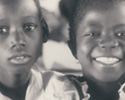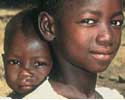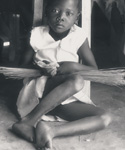|
summary:
In 1992 the sight of a starving child dying in its mother's
arms while waiting for medical assistance in Bawku, northern
Ghana was the catalyst for Charlotte di Vita to found Trade
plus Aid to create ethical employment and raise funds from
the sale of handicrafts to assist the people of Bawku. The
child's death was a result of impending famine due to drought,
which left over 6000 local family farms in the region in ruins.
By
1994, after two successful trading years, Charlotte was able
to donate £25,000 for food security and community-owned seed-credit
programmes to assist 6,472 farmers, 4,062 of which were women.
For the latest information on the Bawku Seed Credit, click
here.
These
farmers received ground nut and sorghum seed, allowing them
to grow the area's staple diet to feed over 25,000 individuals
in Bawku. The farmers were also trained in dry-season onion
growing, in order to provide a regular, year-round income
and alley-cropping and organic composting, in order to improve
soil stability and nutrition. Demonstration farms were established
to show how topsoil erosion could be reduced and how higher
yielding crops could reduce the "hungry season".
In addition, 3000 seedlings were distributed to 600 farmers
to plant trees, like mango and cashew, for economic reasons,
and acacia for construction and also to provide an important
source of income, food and medicine as well as creating shade
and supporting water and soil conservation.
In
1995/6 Trade plus Aid also helped the children of Bawku by
donating £10,869 to fund the building of 3 schools, allowing
1100 children who did not have access to schooling, the chance
of an education and a more secure future.
The
project renovated 2 abandoned and dilapidated school buildings
in Zebilla Town and built 2 schools in Salpiga and Agaogo,
remote communities where Charlotte wanted to provide schooling
to the children who work on their families' farms or as shepherds
by day and so cannot attend regular schools. For more
information on this project, click
here.
Trade
plus Aid also paid for the training of 37 teachers, the development
of a relevant local curriculum and the provision of educational
materials such as teachers' handbooks, educational posters
and teaching aids for mathematics, English and basic science.
The
food security projects were jointly funded by Trade plus Aid
and the British Government (through the ODA, now DfID), who
agreed to match the funds invested by Trade plus Aid. Trade
plus Aid
chose ActionAid, one of the UK's leading development charities,
to implement all of the projects because of its excellent
reputation and experience in Ghana. ActionAid had been working
in Bawku since 1990. ActionAid's programmes are "integrated"
and so tend to include agriculture, health, water, adult and
child literacy, and savings and credit schemes, in order to
tackle the multi-faceted root causes of poverty.
For more information on the work of ActionAid visit www.actionaid.org
|
 |
|

"All in all, we have benefited
a lot from the many ways we have worked together with
you. We hope that future generations will be proud and
build on what we have started with you."
- Ayonde Ayagiba, a woman
from Sapeliga.

"There's a lot of information
going around today which could help us to live a more
meaningful life but we are shut off completely from
most of it. We feel like blind women. We have to depend
on someone who can read and write to lead us. We don't
know where we are going and our children should not
find themselves in this same situation."
- A local woman from Zebilla,
explaining why the schools project was so important
to the community.

|
 |
|